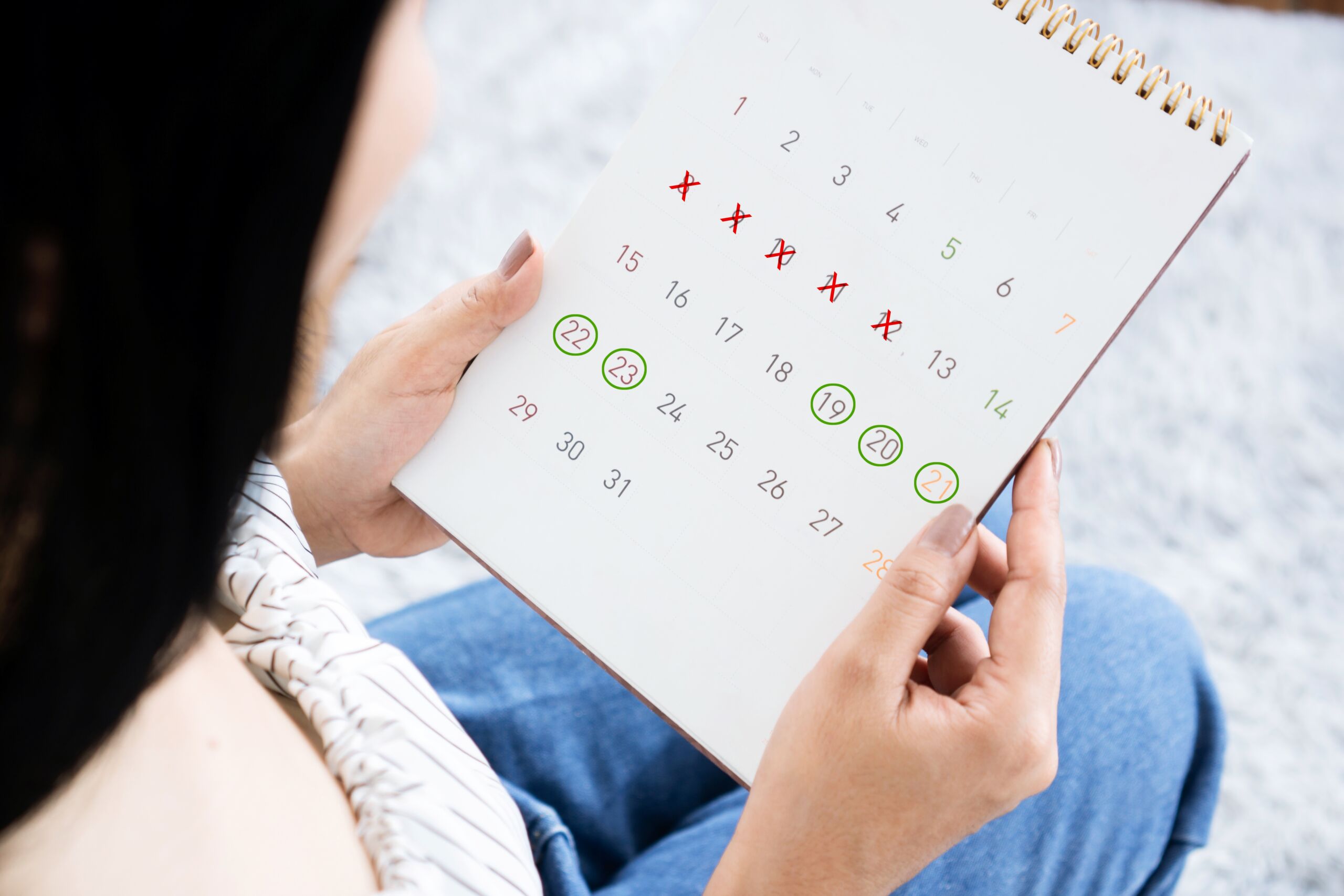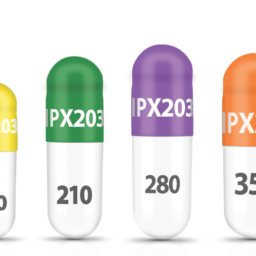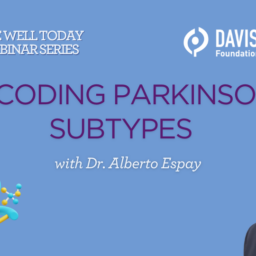Because it is comparatively rare to be diagnosed with Parkinson’s before the age of 50, many people with young-onset Parkinson’s disease (YOPD) face struggles that can go unnoticed. YOPD can cause challenges that older people with Parkinson’s don’t deal with as often, including issues with fertility, young children, and careers. One aspect of YOPD that has been under-recognized until recently is menstruation. If you menstruate and have Parkinson’s, you may deal with worsening motor symptoms around the time of your period, increased anxiety and depression, challenges with managing menstrual products, questions about birth control and Parkinson’s, or feelings of discomfort in sharing your struggles. However, you are not alone, and there are answers to your questions. Part of living well as a woman with YOPD involves managing your periods safely, sustainably, and practically.
What effects does menstruation have on Parkinson’s and vice versa?
There is increasing evidence of a relationship between menstruation and Parkinson’s. Studies have found that Parkinson’s often gets worse around a woman’s period. Motor symptoms can be more pronounced, and medication seems less effective, leading to more OFF time. Additionally, many menstruating women report pain, tiredness, and mental health symptoms. Often, these are worst in the days leading up to the onset of bleeding: pre-menstrual syndrome (PMS) can worsen your mental and physical health. Another study found that 83% of the women surveyed reported that their period symptoms got worse after being diagnosed with YOPD and that they experienced more pain, fatigue, and emotional exhaustion around their period.
As YOPD blogger and activist Omotola Thomas put it, “We all know our medication only works three weeks out of four.” Unfortunately, that is true for many YOPD women, as Parkinson’s and periods can make each other worse. However, some strategies can help you live well as a menstruating woman with Parkinson’s.
How can I manage menstruation in addition to my challenges with Parkinson’s?
As new evidence has emerged showing that menstruation and Parkinson’s symptoms are related, research into what can be done to help has also grown. The first step you may want to discuss with your doctor is taking additional Parkinson’s medications during PMS and the week of your period to help address increased OFF time. Some studies have suggested that taking an hourly dose of levodopa in the time around your period can help with motor fluctuations.
Hormone replacement therapy (HRT) is often used to help symptoms of menopause, and many women with Parkinson’s can benefit from it. HRT helps raise your progesterone and/or estrogen levels and can potentially alleviate your symptoms. Even if you have not started menopause, however, hormone therapy may still be a good treatment option. Hormone treatments suppress ovulation, which may improve your period symptoms. There is also some evidence that estrogen may be neuroprotective, so introducing hormone therapy may help your symptoms regardless of whether you are menopausal.
Additionally, researchers have found that treating menstruating women with estrogen during their periods can help reduce motor symptoms. Because estrogen levels drop during menstruation, keeping them closer to baseline levels can help prevent the worsening of motor symptoms.
Since you can become less responsive to dopaminergic Parkinson’s medications when your estrogen levels drop, one common way to keep your estrogen up is by taking birth control. Your OB/GYN can help you determine what form of birth control might be best for you. For example, traditional pills have been shown to help with combatting the loss of dopaminergic responsiveness. Still, other methods (like the Depo-Provera shot, an IUD, the Nexplanon implant, a vaginal ring, or a transdermal patch) can require less maintenance and can give you peace of mind without needing to think about them every day.
Some women with YOPD and worsening period symptoms undergo intensive procedures. Options include:
- Hysterectomies (removing the uterus)
- Endometrial ablation (destroying the lining of your uterus to reduce or stop menstruation)
- Ovarian radiotherapy (causing early menopause)
However, you may want to consider less invasive treatments first because all women react differently to these procedures. A procedure may completely alleviate your period symptoms, but it can also have side effects and require you to take other hormone-replacement therapies.
 What if I’m not interested in making changes to my medications?
What if I’m not interested in making changes to my medications?
It can feel overwhelming to think about taking yet another medication, especially when there are unpredictable side effects. However, there are several practical steps beyond medication changes that you can take to help manage your Parkinson’s while you are menstruating. Using period products that won’t be as affected by motor symptoms – for example, wearing period panties rather than changing pads or tampons – can help reduce the effects of tremors and dyskinesias.
You can also focus on scheduling your time to reduce your responsibilities during PMS and menstruation. For example, consider getting help from a friend, relative, or babysitter during the week you may be OFF more often or talk to your employer about going part-time during that week so that you can better balance work and period symptoms.
Also, make sure to build a supportive community around you. This can include your care partner, close female friends or relatives, or even a support group for YOPD women. Sharing your feelings with people who care about you and your health is essential for living well and establishing community and support is a big part of that. Remember that you are not alone and that while there is strong evidence that menstruation can make your Parkinson’s worse, there are solutions.

Who should I talk to about managing Parkinson’s while menstruating?
The first, and most important step, is not to be embarrassed. Many women report feeling uncomfortable discussing menstruation, sexual health, and reproduction issues with their doctors or partners. However, menstruation is a natural and regular part of life as a woman. Managing your periods and your Parkinson’s in tandem is an essential part of living well. So, share your concerns with your care team, especially when it affects you at least one out of every four weeks.
One cornerstone of your team is your OB/GYN. Seeing a provider specializing in female reproductive health is your best place to start. Though they may not have experience treating YOPD women specifically, OB/GYNs have extensive experience and training to help women of all walks of life navigate their gynecological health. Whether you are considering birth control, are interested in learning about different menstrual products, are considering getting pregnant, or are thinking about a more permanent procedure like a hysterectomy, your OB/GYN is the hub for all the best information.
Another great source is a Movement Disorder Specialist (MDS). These doctors specialize in Parkinson’s and other movement disorders. They are well-equipped to help you handle medication changes and balance the side effects and quality of life changes that can ensue. When looking for an MDS, you may feel more comfortable being treated by a female. Luckily, even if there isn’t one in your area, many doctors practice telemedicine due to the continuing effects of covid-19. Coordinating care between your MDS and OB/GYN can help make sure you get the treatment that improves your mental and physical health, balancing your Parkinson’s and period symptoms while still helping you live well. Your primary care doctor or family doctor can also be an excellent resource for these types of conversations and care.
You may also want to consider seeing a therapist or other mental health professional. While many women experience physical symptoms due to their periods and Parkinson’s coinciding, it is also common to experience mental health changes around your period. For example, you may feel more apathetic, anxious, depressed, or frustrated. Mental health care is a great resource for all people with Parkinson’s, and it can be especially helpful to receive holistic care when facing combined period and Parkinson’s symptoms. You can also consider joining a support group for people with YOPD women to help find support, community, and answers.
Finally, and perhaps most importantly, it’s best to involve your care partner. A care partner can help you track your symptoms and stay on top of your schedule. Knowing when your period might make your Parkinson’s worse will allow you to plan together. Your partner can also support your care: they can pick up various types of menstrual products for you to try, come with you to your appointments, and help you structure your and your family’s lives to minimize challenges with your period.
Menstruation is a normal part of being a woman but combined with Parkinson’s, it can affect your quality of life and wellbeing. Trying different medications, menstrual products, and schedules can help you balance the effects of Parkinson’s and your period. And working closely with your care team will help turn a daunting challenge into a manageable part of your life as a YOPD woman.
Learn more
Are you interested in more information about YOPD and women with Parkinson’s? You can listen to the recording of our YOPD Women’s Council webinar on Menstruation, Menopause, Hormones, and Parkinson’s and read about the benefits of joining a women’s only Parkinson’s support group. Check out our YOPD Resources, or watch our webinar on Women and Parkinson’s.

















